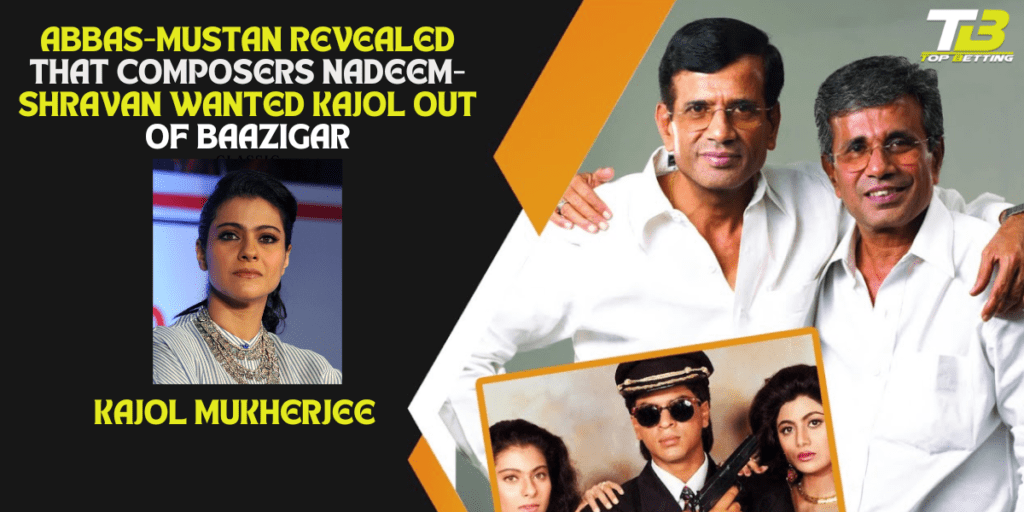
Abbas-Mustan made revelations about Baazigar
In the annals of Bollywood history, few films have left an indelible mark on the collective consciousness of the nation quite like Baazigar. This 1993 romantic thriller, directed by the dynamic duo of Abbas-Mustan, captivated audiences with its gripping narrative, electrifying performances, and unforgettable musical score. However, the journey to bring this cinematic masterpiece to life was not without its share of behind-the-scenes drama.
Nadeem-Shravan’s Objection to Kajol’s Casting
As the film’s music composers were being finalized, Abbas-Mustan approached the celebrated duo of Nadeem-Shravan, fresh off the blockbuster success of Aashiqui. The directors had a single condition – they wanted Kajol, the rising star of the industry, to play the lead female role. But to their surprise, Nadeem-Shravan had a different plan in mind.
The Personal Conflict with Kajol and Tanuja
According to the directors, Nadeem-Shravan harbored a personal issue with Kajol and her mother, the legendary actress Tanuja. Apparently, the composers had attempted to take Kajol under their wing after her impressive debut in Bekhudi, for which they had composed the music. However, during a visit to the actress’s residence, they were taken aback by Tanuja’s behavior, leading them to decide that they would never work with Kajol again.
Abbas-Mustan’s Unwavering Commitment to Kajol
Undeterred by Nadeem-Shravan’s objections, Abbas-Mustan remained steadfast in their decision to cast Kajol in the lead role. They had already finalized the actress and even signed a contract with her. Refusing to budge from their position, the directors told the composers, “If the film will be made, Kajol will star in it.” This uncompromising stance ultimately led Nadeem-Shravan to withdraw from the project, paving the way for Anu Malik to compose the iconic soundtrack of Baazigar.
Anu Malik’s Musical Magic
Anu Malik’s compositions for Baazigar have become the stuff of legend, with timeless melodies like “Ye Kaali Kaali Aankhen,” “Kitaben Bahut Si,” “Ae Mere Humsafar,” and the title track, “Baazigar O Baazigar.” These songs, perfectly complementing the film’s thrilling narrative, have endured the test of time and continue to captivate audiences even today.
The Enduring Legacy of Baazigar
Baazigar went on to become a massive critical and commercial success, cementing the careers of its lead actors, Shah Rukh Khan and Kajol, and solidifying Abbas-Mustan’s reputation as master storytellers. The film’s impact has transcended the boundaries of the silver screen, becoming a beloved classic that has inspired countless filmmakers and captivated generations of moviegoers.
Nadeem-Shravan’s Subsequent Split and Shravan’s Passing
The Nadeem-Shravan duo, once a formidable force in the music industry, eventually parted ways in 2005. Tragically, Shravan passed away in 2021 due to COVID-19, leaving behind a rich musical legacy that continues to be celebrated by fans.
Kajol’s Enduring Popularity and Upcoming Project
Kajol, on the other hand, has gone on to become one of the most beloved and respected actresses in the industry, with a filmography that boasts of several iconic performances. She is currently gearing up for her next project, Do Patti, which is sure to further cement her status as a cinematic icon.
The Lasting Impact of Baazigar
The impact of “Baazigar” extends far beyond its initial release in 1993. This film, directed by Abbas-Mustan and starring Shah Rukh Khan, Kajol, and Shilpa Shetty, marked a turning point in Bollywood cinema. Its bold storytelling and Shah Rukh Khan’s portrayal of an antihero broke conventions, challenging traditional narratives in Indian cinema. “Baazigar” not only achieved commercial success but also sparked discussions on morality and character complexity.
The lasting impact of “Baazigar” can be seen in its influence on subsequent films, particularly in the portrayal of darker, more layered protagonists. This shift contributed to the evolution of Bollywood storytelling, encouraging experimentation and risk-taking in narrative structures. Additionally, the film’s iconic soundtrack, composed by Anu Malik, continues to resonate with audiences.
Beyond its entertainment value, “Baazigar” remains a cultural touchstone, illustrating the transformative power of innovative filmmaking and paving the way for future cinematic experimentation in Indian cinema.
Lessons Learned and Reflections
The behind-the-scenes drama surrounding Baazigar’s casting offers valuable insights into the complexities of the film industry. It underscores the importance of maintaining professional relationships, the need to navigate personal conflicts, and the pivotal role that directors play in shaping the destiny of a project. The film’s continued popularity and cultural relevance serve as a testament to the timeless appeal of great storytelling and the ability of cinema to captivate and inspire audiences across generations.

Conclusion
The story of Baazigar’s making is a captivating one, filled with unexpected twists and turns. From the initial objections of Nadeem-Shravan to the unwavering commitment of Abbas-Mustan, the film’s journey to the silver screen is a testament to the power of perseverance and the enduring magic of cinema. As Baazigar continues to be celebrated and rediscovered by audiences, it serves as a poignant reminder of the enduring impact that a single film can have on the cultural landscape of a nation.











